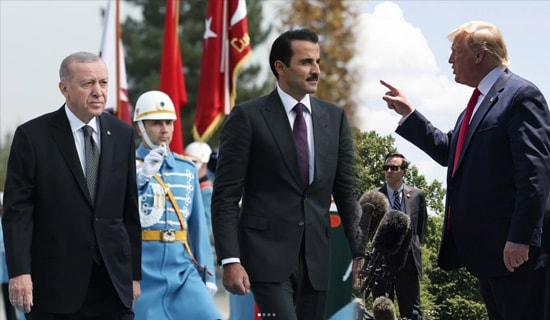Following the UK's Brexit referendum, in which the country voted to leave the European Union, Ghassan Charbel, editor-in-chief of the London-based daily Al-Hayat, wrote about a friend of his, an Iraqi refugee who had just received British citizenship and who voted in the referendum. His friend, he said, was happy to have found a safe haven from the horrors in his home country, and was very impressed by Britain's democracy, its free and fair elections, and its leaders' willingness to take responsibility, as expressed by the resignation of Prime Minister David Cameron. But his friend's happiness, said Charbel, did not last long, because the referendum outcome did not bode well for him.
Following are excerpts from Charbel's article:[1]

Ghassan
Charbel (Image: Beirutme.com)
"My Iraqi friend was so happy when he received his British citizenship. He now had a safe haven to protect his sons and grandsons from the horrors of the Islamic State and the 'compassion' of Al-Hashd Al-Sha'abi [Shi'ite militias operating in Iraq]. A few weeks after [becoming a citizen], he received documents informing him that he was entitled to vote in a referendum that would determine whether Britain would remain in the European Union or leave it.
"He felt deep gratitude, since he had never been asked for his opinion on Iraqi affairs, or Iraq's future. [In Saddam Hussein's Iraq], the interior minister determined election results before the elections were even held - and [in any case] they constituted only a renewed oath of allegiance to 'Mr. Leader President' and nothing more. Iraqi intelligence would organize petitions signed in blood to prove [the people's] absolute loyalty to 'the trailblazer.' After the removal of the historic leader, [Iraqi] elections changed - [then,] you had to choose between the 'Shi'ite House,' the 'Sunni House' or the 'Kurdish House' - houses built on the historic bitterness [accumulated by the sides] while [each side] bore a deep desire to divorce the other houses.
"[My friend] picked out a tie to match the gravity of this event, [and when he reached the polling place] he saw no police officer outside, and smelled no intelligence personnel. He also heard no chants of 'with spirit and blood [we will redeem the leader],' and no one said 'Cameron forever, or we will set the land on fire.'
"The queue at polling place was relatively long, and the atmosphere was calm - like at a public library. The lady handed him a plain piece of paper, [on which] he had to mark one of two options - Remain or Leave. He noticed that no one in the queue asked the others how they would vote. Strange indeed.
"In truth, he wasn't seriously worried, because deep in his heart he was convinced that the regime wasn't calling for a referendum so that it could lose it, and that its apparatuses would surely find a way to ensure the [desired] outcome. So he calmly went to bed. The outcome would in no way cloud his British and European tranquility.
"He slept soundly [thinking] that British public opinion was certainly smarter than that of our [Arab] public. [He thought the British public] might express bitterness at Brussels bureaucracy, and at its unelected leadership, the weight of European laws, the problem of immigrants streaming [into Britain] from Eastern Europe, the lack of clarity regarding identities, the effects of globalization, and the fangs of the global banking corporations. [But he was certain that] British public opinion would never risk creating a crack in the European building, and sending shockwaves through the British home itself.
"The morning was indeed rough. The Britons did not heed the call of David Cameron, who had demanded that they seriously consider the interests of their sons and grandsons and not fall for slogans such as 'Britain First' and 'Take Back Control and Independence.' [However,] the logic of the [British] island defeated the logic of the greater house [the EU]. The remnants of imperialist sentiment and [the desire] to maintain [the British] character defeated the adventure of partnership and pluralism. Simple fear defeated complex hope...
"My Iraqi [friend] went to see [the vote tally] on television. The word 'earthquake' was reiterated frequently, and markets and stock exchanges began to suffer losses... Someone spoke of an historic turning point and compared [the outcome] to the fall of the Berlin Wall; another warned that the blow struck by the Britons to the European order was like the one struck by Gorbachev to the Soviet Union.
"A few hours later, David Cameron appeared and said that the Britons had spoken, that their wishes would be respected, and that he would resign and leave the premiership to someone else. The Iraqi rubbed his eyes: What did Cameron do that he should leave? The man who ordered the [Iraqi] army to invade Kuwait [Saddam Hussein] did not resign. [Iraqi prime minister Nouri] Al-Maliki, under whose watch the army fragmented, and who delivered Mosul to ISIS, did not resign. Our [Arab] culture has no such thing as an official who apologizes or resigns. Our leader does not leave before ensuring that he takes the country [with him] into the abyss.
"But the Iraqi's rejoicing in his British safe haven did not last long. The map of Britain may [yet] be torn to shreds, and dwindle, like the maps of Iraq and Syria. In Scotland and [Northern] Ireland, there is an increased sense that they must divorce [Britain]. The British precedent could recur on the old continent, since the radical right has discovered a new opportunity. The role played by Europe is expected to recede in the face of the voraciousness of the [Russian] czar and the rise of the Chinese giant and the nation of Donald Trump. This is fate.
"[My] Iraqi [friend] lost twice; the Arab is used to losing twice."
Endnotes:
[1] Al-Hayat (London), June 27, 2016.




.jpg)